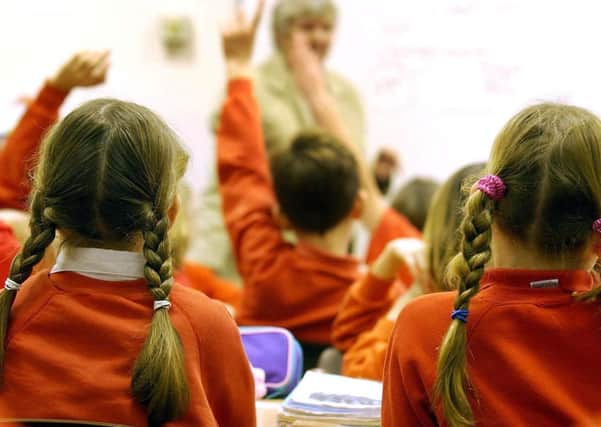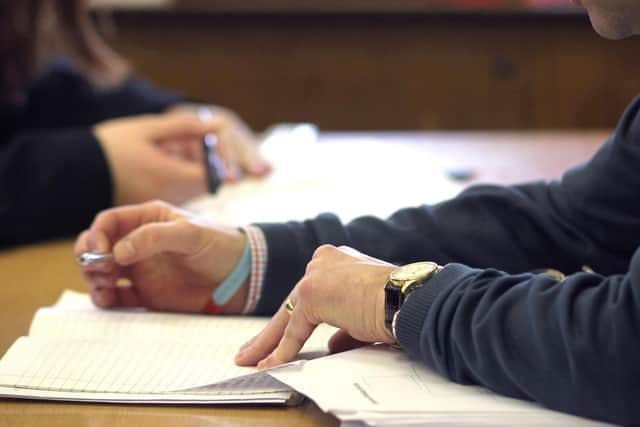Why exclusions are no answer to bad behaviour in class: Dave Whitaker


In such trying circumstances, we have had to accept that the old ways of doing things won’t necessarily work in this changing world we find ourselves.
Disruption of course brings with it opportunity for change, but we must ensure any change is in the right direction.
Advertisement
Hide AdAdvertisement
Hide AdThat is why I was so dismayed to read in a recent Ofsted briefing that fixed-term exclusions are rising in some schools, though thankfully only a small number to date.


The briefing attributed this rise to schools “not being able to put in place their usual layers of sanctions before exclusion, such as putting pupils who were disrupting learning into another lesson or into isolation”.
It is disappointing that even when children have been through a very difficult period, some schools’ first port of call for unwanted behaviour is sanctions like isolation, and when that isn’t available, they up the ante to fixed-term exclusions.
As Director of Learning in a multi-academy trust, I see the inability to use usual sanctions as a perfect opportunity to rethink how we handle poor behaviour – and not by doubling down with ever harsher punishments.
Advertisement
Hide AdAdvertisement
Hide AdWe must remember that children have experienced trauma and anxiety over the course of this year. Even for children with stable homes and parents who have done their utmost to support their education and wellbeing, living through a pandemic with all the anxiety and stress that entails will have had an impact.
For children in homes with poverty, abuse or neglect, their experience of lockdown may have been unbearable. This is where we need to start when considering how to manage challenging behaviour. We have to look at the why, not what, when tackling challenging behaviour. Behaviours are driven by emotions and feelings – they are what we need to understand. Understanding what drives behaviour is how we change it long term.
Whilst I understand the appeal of quick fixes like isolation booths and fixed- term exclusions, it’s often the same kids that end up back in the isolation booth over and over again. It doesn’t really fix anything; to encourage long term behaviour change and stop the merry-go-round of ongoing punishments, we have to put the work in.
And it is hard work. Digging deep to find out what the causes of behaviour are, and then supporting children so they can learn to manage their behaviour takes time, knowledge and effort.
Advertisement
Hide AdAdvertisement
Hide AdAt Wellspring we have vast experience in caring for children who have social, emotional and mental health needs, and that practice is now embedded in all our schools. We are proud of our record. We have never permanently excluded anyone, and we regularly receive praise for the behaviour within our schools from Ofsted.
Contrary to widespread belief, adopting a relational approach that focuses on trauma and understanding does not mean being ‘soft’ or accepting poor behaviour. Far from it. We have consistently high standards and expect the best from our pupils, and this hasn’t changed as a result of the pandemic.
We just choose to see our role as enabling children to behave better and giving them the skills and understanding to do so.
It doesn’t just feel ethically right. It’s proven to work. In our specialist Social, Emotional and Mental Health schools, which typically cater for the most challenging behaviours, we measured how long it took a young person to return to learning after an incident requiring adult intervention.
Advertisement
Hide AdAdvertisement
Hide AdAfter following a relational approach for two years, the percentage of incidents which took five minutes or less to resolve in a return to learning doubled from eight to 16 per cent. In the same period, incidents which took more than 60 minutes to return to learning dropped from 25 to nine per cent.
As educators, we play a role that goes far beyond teaching the curriculum. We have a responsibility to the communities we serve, and in communities suffering high levels of deprivation and the worst effects of the pandemic, zero tolerance approaches and exclusions will do little to support them.
Dave Whitaker is Director of Learning at Wellspring Academy Trust, a multi academy trust operating 25 schools across Yorkshire and Lincolnshire.
Support The Yorkshire Post and become a subscriber today. Your subscription will help us to continue to bring quality news to the people of Yorkshire. In return, you’ll see fewer ads on site, get free access to our app and receive exclusive members-only offers. Click here to subscribe.
Comment Guidelines
National World encourages reader discussion on our stories. User feedback, insights and back-and-forth exchanges add a rich layer of context to reporting. Please review our Community Guidelines before commenting.